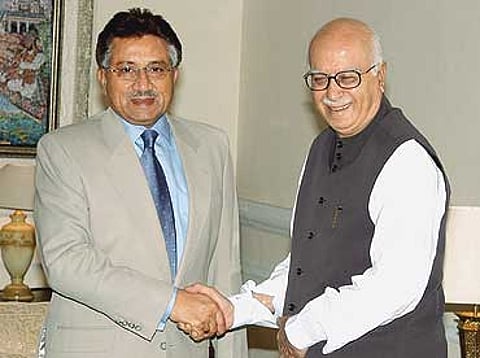A Tango With The Bogeyman
As he goes around Pakistan, BJP chief L.K. Advani finds the ghosts of the past haunting him everywhere <a > Updates</a>

The BJP leader just about met everyone who matters in Pakistan—the president, the prime minister, the foreign minister, Opposition leaders, the senate chairman; he was breaking bread with them at lunch or dinner. Amidst all this bonhomie and backslapping, the questions kept surfacing: has Advani indeed changed? And, is the change permanent? A senior official close to the Islamabad establishment, perhaps, had an appropriate reply, "Who could believe that Communist-hater Richard Nixon would land up in China? Life plays tricks on you. Advani, today, is looking for his place in history. When Kasuri told Advani in their meeting that a solution to Kashmir has to be taken keeping in mind the wishes of the people of Jammu and Kashmir, the Indian leader kept silent. Again, in his meeting with President Musharraf, Advani rightly emphasised on the need to have a timeframe on Kashmir."
For good measure, Advani never missed the opportunity to emphasise that the UPA government was taking forward what the BJP-led NDA had initiated. "The joint statement issued in January 2004 in Islamabad marked a breakthrough in relations between the two countries," he said, pointing out that the decision to undertake peace initiatives was taken on the basis of the declaration by Pakistan that it will not allow its territory to be used for terrorist activities against India.
In his meeting with the architect of Mullah diplomacy, Maulana Fazlur Rehman, Advani reportedly promised, "Peace will not become hostage to the resolution of problems. I will say that the peace process has already become irreversible." That he should have chosen Rehman to spell out the irreversibility of the peace process was no coincidence. Observers remembered how Rehman had been told on his trip to India about the Vajpayee government's readiness to resume air flights to Pakistan, after months of freeze in diplomatic relations and eyeball-to-eyeball confrontation on the borders.
At the time of writing this report, Advani was still in Islamabad, due to fly to Karachi where he was born and where he studied. Back in Pakistan after 26 years, when he had come here as information minister, he recalled his last visit to his ancestral house and school. "The house was in the same condition as we had left it. I don't know in what state it will be now," he said.
But the mention of Karachi promptly brought back what Advani had assidiuously sought to exorcise on the trip: the ghosts from the past. For, Karachi is where Mohammad Ali Jinnah is buried. When asked by the media if he had been involved, before his migration to India post-Partition, in a plan to assassinate Jinnah, Advani first refused to comment. He then termed the allegation "scurrilous." "I do not think I need to comment. It is totally baseless," he said.
Just as Pakistan and India need to reconcile with their past for a durable peace in the present, Advani too, perhaps, has to discover a method of negotiating with people's memory about his past which he so desperately wants to reinvent in the present.
Tags